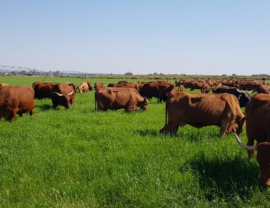
The Ministry of Agriculture has provided an update on the ongoing outbreaks of Foot and Mouth Disease (FMD) in KwaZulu-Natal and the Eastern Cape, with intensified control measures being implemented to curb the spread of the virus.
As reported to the World Organisation for Animal Health (WOAH), KwaZulu-Natal has experienced 165 outbreaks of Foot and Mouth Disease, with 18 of these having been closed and 147 still active.
In a statement, the Ministry said an enlarged Disease Management Area (DMA) was declared on 17 March 2025, where signs of continued virus activity persist.
“Livestock owners are urged to maintain strict biosecurity and adhere to movement protocols to curb disease spread. Full compliance could result in a noticeable reduction of viral load after 28 days,” the Ministry said.
A new outbreak in Bergville, outside the newly-declared DMA, has been confirmed. The Ministry said the traceback suggests the infection originated from within the extended DMA boundaries before the declaration was made.
“Two additional suspect cases outside the DMA are under investigation and all these locations have been quarantined.
“Surveillance and vaccination efforts are being intensified within affected zones and a 10 km radius around infected locations. A meeting was recently held with key stakeholders to finalise the Movement Control Protocol for the DMA, now accessible via the department’s and KZN Agriculture’s official platforms,” the Ministry said.
Eastern Cape Disease Management Area Update
The Eastern Cape has reported 40 outbreaks, with 1 closed and 39 still open.
“One newly reported outbreak was detected through routine surveillance and reported to WOAH, but blood test results indicate past infection only, with no evidence of active viral circulation,” the Ministry of Agriculture said.
The Ministry said ongoing testing on selected properties aims to finalise surveillance efforts within the DMA, with the hope that the results will support the lifting of DMA restrictions in the near future.
In light of the encouraging results from ongoing surveillance, the department is now able to introduce targeted relief measures for farmers within the DMA whose herds have consistently tested negative and have not received FMD vaccinations.
These farms will now be permitted to process milk for local consumption through single pasteurisation, instead of the previously mandated double pasteurisation or UHT treatment.
Additionally, such farms will no longer be required to conduct 28-day interval testing to qualify for direct slaughter. These measures are intended to ease the economic burden on compliant farmers. Eligible farm owners are urged to contact their local State Veterinarian to apply for the necessary exemptions.
National biosecurity and movement controls
The following control measures introduced in October 2022 remain in effect:
- Movement of cloven-hoofed livestock across South Africa requires a health declaration from the owner.
- Newly-introduced cattle, sheep, or goats must be isolated from resident herds for at least 28 days.
“Farmers are strongly advised to limit animal movements and exercise caution when procuring animals. Section 11 of the Animal Diseases Act imposes a legal duty on any owner or manager of animals to take all reasonable steps to prevent their animals from becoming infected with any disease and to prevent the spread of any disease from their animals or land to other animals or other properties,” the Ministry said.
Essential biosecurity measures include limiting and/or postponing the introduction of new animals if possible and, if necessary, only introducing animals from known clean farms with a health declaration, preventing nose-to-nose contact of farm animals with animals outside the farm, maintaining secure farm boundaries, and restricting access for people and vehicles as much as possible.
Report suspicious symptoms
FMD is a controlled animal disease in terms of the Animal Diseases Act, 1984 (Act No 35 of 1984). The Ministry has urged that any suspicious clinical symptoms (salivation, blisters in the mouth, limping or hoof lesions) must be reported to the local State Veterinarian immediately and such animals must not be moved under any circumstances.
The Act prescribes certain control measures, like isolation and movement control, that are being enforced by Veterinary Services. – SAnews.gov.za


